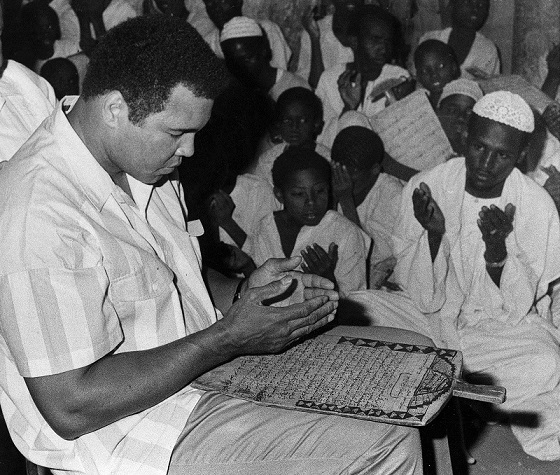LOS ANGELES – One year after Muhammad Ali’s death, the fact that the boxing legend, Olympian, civil rights warrior, humanitarian, and trailblazer for Parkinson’s disease awareness was a practicing Muslim has been removed from his legacy.
“It’s up to Muslims to really understand his legacy, to really preserve it, and to put it where it ought to be in terms of the pantheon,” Sherman Jackson, a Muslim professor at the University of Southern California who’s written extensively about Islam and black America, told BuzzFeed News on Saturday, July 8.
The change started after Authentic Brands Group (ABG) paid an undisclosed amount for Ali’s intellectual property in 2013, including troves of photos and videos, as well as trademarked slogans such as “Float Like A Butterfly, Sting Like A Bee.”
The New York–based licensing company that also owns the rights to Marilyn Monroe, Elvis Presley, and other American superstars, runs the Ali social media accounts, including Instagram with more than 2 million Instagram followers, 876,000 Twitter followers, and 11.8 million Facebook “likes.”
Across Ali’s social media accounts, Islam is absent from pages with his Facebook biography noting “his early relationship with the Nation of Islam,” without referring to the role Islam played in his life.
Ali’s family has emphasized six core principles as key to his legacy: confidence, conviction, dedication, giving, respect, and spirituality. In public aspects of the Ali legacy, all those values are reflected except spirituality.
During past Ramadan and `Eid Al-Fitr, no single note on the important Islamic occasions was posted on the Ali social media feeds.

Whitewashing Ali
Only a single Facebook photo, posted back in 2014, was found referring to Ali as a Muslim, though he was photographed on many occasions embracing Islam, including on visits to Africa and the Middle East.
“You’re really whitewashing him, so to speak, by not coming to terms with that. He was Muslim, and he was an American hero. He was black, and he was an American hero,” said Harris Zafar, a national spokesperson for Ahmadiyya group.
“That’s how you honor him, not by erasing those traits of his.”
Zaki Barzinji, who served as the Obama administration’s US Muslim liaison and who attended Ali’s funeral on behalf of the White House, said the theme of the `Eid event was Islam’s deep roots in the United States.
In his address, Obama said Ali was “as proud of his blackness as he was of his faith.”
“The crux of his remarks were about Muhammad Ali, about how he was a proud African-American, a proud Muslim, an example of how the Muslim community has been so integrated,” Barzinji said.
Jihad Turk, president of Bayan Claremont, an Islamic seminary in Southern California, has raised hundreds of thousands of dollars to launch a new Ali-inspired program that blends Islamic studies and leadership skills.
Turk, who was a signatory to Ali’s will, said the idea was to recognize how Islam is intertwined with the symbolism of Ali.
“It’s not an insignificant or marginal aspect of the story of who Muhammad Ali was,” Turk said. “It was at the core of who he was, as a man and as a legend.”